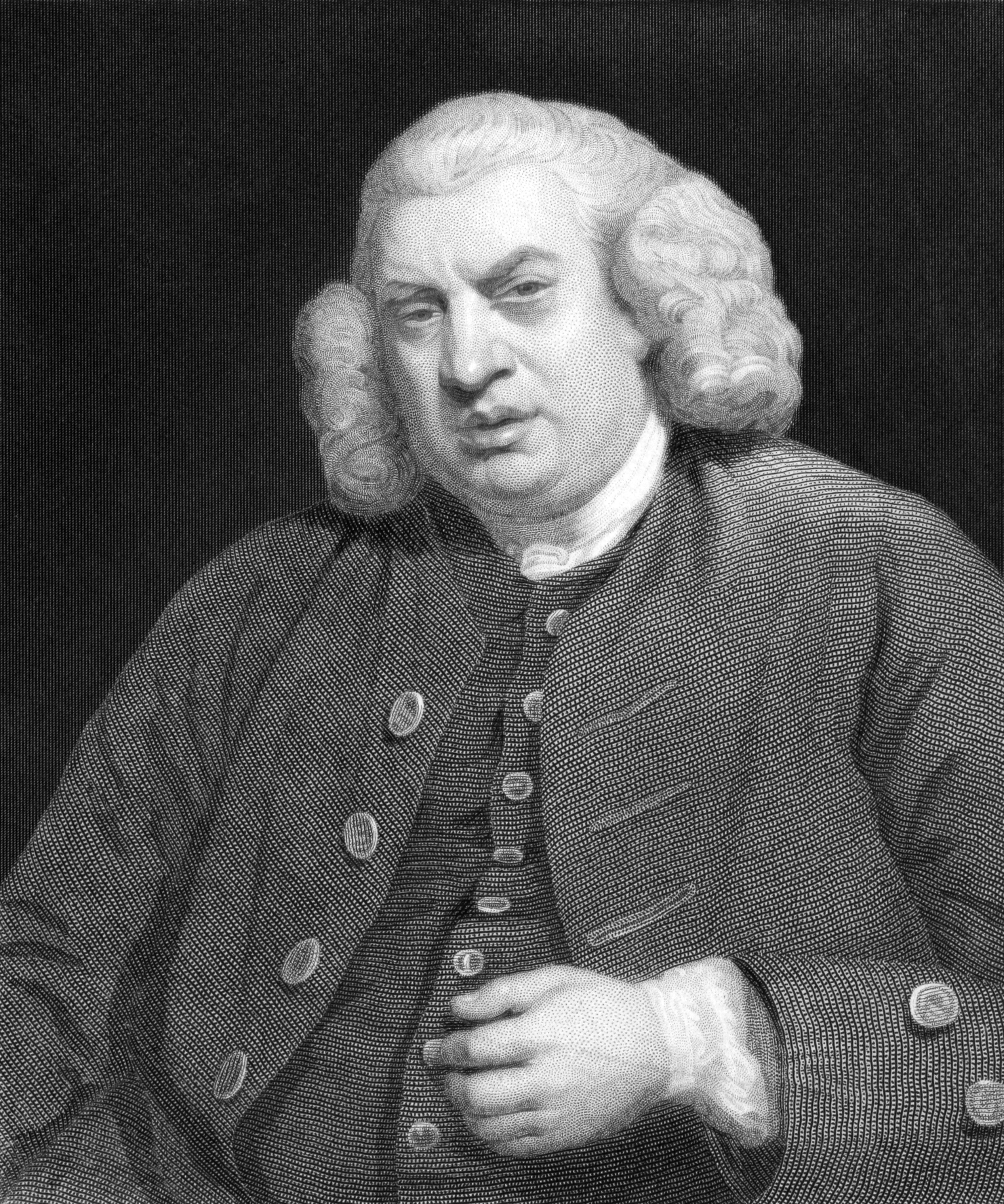Samuel Johnson frasi celebri
“Richardson aveva colto il nocciolo della vita… mentre Fielding si era accontentato del guscio.”
da Thraliana , a cura di Balderston, I, p. 555
riferendosi ai critici; citato in James Boswell, Vita di Samuel Johnson, 1754
citato in James Boswell, Vita di Samuel Johnson, 14 luglio 1763
“Ciò che è scritto senza sforzo è generalmente letto senza piacere.”
da Miscellanies
Johnson Miscellanies
Samuel Johnson Frasi e Citazioni
“Fielding è capace di descrivere un cavallo o un asino ma non ci è mai riuscito con un mulo.”
da Johnson Miscellanies, a cura di George Birkbeck Norman Hill, I, pp. 273-4
Origine: Citato in Ian Watt, Le origini del romanzo borghese (The Rise Of The Novel), traduzione di Luigi Del Grosso Destrieri, Bompiani, Milano, 1985.
“Le cifre tonde sono sempre false.”
citato in Apophthegms, Sentiments, Opinions and Occasional Reflections di Sir John Hawkins, in Johnsonian Miscellanies (1897), vol. II, pag. 2, edito da George Birkbeck Hill
Johnson Miscellanies
citato in James Boswell, Vita di Samuel Johnson, 30 aprile 1773
Origine: Citato in John Lukacs, Democrazia e populismo, traduzione di Giovanni Ferrara degli Uberti, Longanesi, 2006, p. 152.
citato in James Boswell, Vita di Samuel Johnson
Your manuscript is both good and original, but the part that is good is not original and the part that is original is not good.
[Citazione errata] Questa citazione viene spesso attribuita a Johnson ma non trova alcun riscontro nelle opere o nelle lettere dello scrittore, né tanto meno nelle biografie di Johnson scritte dai suoi contemporanei.
Attribuite
Origine: Samuel Johnson did not say: "Your manuscript is both good and original. But the part that is good is not original, and the part that is original is not good." http://www.samueljohnson.com/goodorig.html, Samuel Johnson.com.
“In quante poche case degli amici sceglierebbe di stare un uomo quando è ammalato!”
Origine: Citato in Boswell, Life of Johnson, IV.
Origine: Citato in Dizionario delle citazioni, a cura di Italo Sordi, BUR, 1992. ISBN 14603-X
“La natura ha dato alla donna un tale potere che la legge ha giustamente deciso di dargliene poco.”
Origine: Da Letters, I.
Origine: Citato in Dizionario delle citazioni, a cura di Italo Sordi, BUR, 1992. ISBN 14603-X
Samuel Johnson: Frasi in inglese
“Marriage has many pains, but celibacy has no pleasures.”
Origine: The History of Rasselas, Prince of Abissinia (1759), Chapter 26
The Patriot (1774)
March 20, 1782
Life of Samuel Johnson (1791), Vol IV
“Greek, sir, is like lace; every man gets as much of it as he can.”
1780
Life of Samuel Johnson (1791), Vol IV
“Sir, I look upon every day to be lost, in which I do not make a new acquaintance.”
November 1784, p. 566
Life of Samuel Johnson (1791), Vol IV
Pitt's Reply to Walpole, Speech, March 6, 1741. This is the composition of Johnson, founded on some note or statement of the actual speech. Johnson said, "That speech I wrote in a garret, in Exeter Street." Boswell: Life of Johnson, 1741
Bartlett's Familiar Quotations, 10th ed. (1919)
July 6, 1763, p. 120
Life of Samuel Johnson (1791), Vol I
September 14, 1773
The Journal of a Tour to the Hebrides (1785)
Feb. 15, 1766, p. 145
Life of Samuel Johnson (1791), Vol II
“Knowledge is more than equivalent to force. The master of mechanicks laughs at strength.”
Origine: The History of Rasselas, Prince of Abissinia (1759), Chapter 13; variant with modernized spelling: Knowledge is more than equivalent to force. The master of mechanics laughs at strength.
“He who praises everybody praises nobody.”
Johnson's Works (1787), vol. XI, p. 216; This set included the Life of Samuel Johnson by Sir John Hawkins
1773
Bartlett's Familiar Quotations, 10th ed. (1919), Life of Johnson (Boswell)
Vol. I, p. 137
Letters to and from Dr. Samuel Johnson
Variante: The use of traveling is to regulate imagination by reality, and instead of thinking how things may be, to see them as they are.
“Many things difficult to design prove easy to performance.”
Origine: The History of Rasselas, Prince of Abissinia (1759), Chapter 26
“Come, let me know what it is that makes a Scotchman happy!”
October 23, 1773
Ordering a glass of whisky for himself
The Journal of a Tour to the Hebrides (1785)
“Was ever poet so trusted before?”
1774
Bartlett's Familiar Quotations, 10th ed. (1919), Life of Johnson (Boswell)
No. 151 (27 August 1751). http://books.google.com/books?id=VvhDAAAAYAAJ&q=%22avarice+is+generally+the+last+passion+of+those+lives+of+which+the+first+part+has+been+squandered+in+pleasure+and+the+second+devoted+to+ambition%22&pg=PA262#v=onepage
The Rambler (1750–1752)
The Life of Addison
Lives of the English Poets (1779–81)
“Example is always more efficacious than precept.”
Origine: The History of Rasselas, Prince of Abissinia (1759), Chapter 29
“Here's to the next insurrection of the negroes in the West Indies.”
September 23, 1777, p. 363
A toast made by Johnson, as Boswell states, "when in company with some very grave men at Oxford".
Life of Samuel Johnson (1791), Vol III
“It might as well be said, "Who drives fat oxen should himself be fat."”
In response to a line of a tragedy that went 'Who rules o'er freemen should himself be free." June 1784
Life of Samuel Johnson (1791), Vol IV
“With these celestial Wisdom calms the mind,
And makes the happiness she does not find.”
Origine: Vanity of Human Wishes (1749), Line 367
Origine: Anecdotes of Samuel Johnson (1786), p. 281
“Trade's proud empire hastes to swift decay.”
Origine: Bartlett's Familiar Quotations, 10th ed. (1919), Line added to Goldsmith's Deserted Village
1781, p. 479
Life of Samuel Johnson (1791), Vol IV
“He delighted to tread upon the brink of meaning.”
The Life of Dryden
Lives of the English Poets (1779–81)
